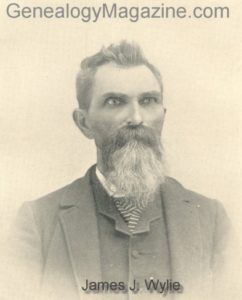 JAMES JACKSON WYLIE, deceased, who for many years was a leading representative of stock raising interests of western Texas, was born in Tishomingo county, Mississippi, in 1834. His father, Robert Kelsey Wylie, was a native of North Carolina, in which state he was married, subsequently removing to Corinth, Mississippi, while in 1854 he became a resident of Anderson county, Texas, where he made his home until his death. In his family there were nine children, seven sons and two daughters, and the sons after the father’s death removed to western Texas and entered the stock business, in which they prospered, accumulating considerable wealth.
JAMES JACKSON WYLIE, deceased, who for many years was a leading representative of stock raising interests of western Texas, was born in Tishomingo county, Mississippi, in 1834. His father, Robert Kelsey Wylie, was a native of North Carolina, in which state he was married, subsequently removing to Corinth, Mississippi, while in 1854 he became a resident of Anderson county, Texas, where he made his home until his death. In his family there were nine children, seven sons and two daughters, and the sons after the father’s death removed to western Texas and entered the stock business, in which they prospered, accumulating considerable wealth.
James J. Wylie removed from Anderson county in 1860 and took up his abode on Barton’s Creek in Erath county, which at that time was an Indian country, the red men being more numerous than the white settlers. He turned his attention to the stock business, trading from there to Henderson and Anderson counties. After a few years he confined his operations to the country between the mouth of Oak Creek on the Colorado river to Horsehead crossing on the Pecos. He enlisted in the ranger service under Captain M. B. Lloyd, now president of the First National Bank of Fort Worth. This company was afterward transferred to the command of Captain Whitesides, who was killed in the Cisco cyclone.
After serving three years as a ranger he returned to Barton’s Creek, Erath county, and was married in 1877 to Miss Mary V. Anderson, a sister of R. G. Anderson. She is a native of Anderson county, Texas, born in 1861, and is a daughter of John C. Anderson, one of the pioneers of this state. With three children she yet survives her husband. These are Kelsey C., Rena and Mabel C. Wylie.
In 1881 Mr. Wylie came to Taylor county, where he established a home for his family. Selling his stock interests in Runnels county to his brothers, he here engaged in the wholesale grocery and ranch supply business in Abilene, which he carried on for about five years. He continued to maintain his stock interests in Taylor county, however, up to the time of his death, which occurred on the 26th of March, 1896. He lived for many years upon the extreme edge of civilization and was engaged in numerous skirmishes with the Indians, their principal offense, however, being horse stealing, in which they engaged at every possible opportunity. To such men of courageous spirit, strong determination and unconquerable energy Texas owes her growth and her transformation from a wild unsettled district into a region of advanced civilization. Hostile savages vainly tried to stem the westward tide of progress but Mr. Wylie and his contemporaries carried on the work, hewing out the roads over which the onward march of material, intellectual and moral development has been made, until the country is dotted here and there with churches and schools as well as the business interests representing commercial and industrial activity, together with the splendid farms and ranches which indicate the efforts of the agriculturist. Mr. Wylie was in this part of the country as early as 1868, traveling all over western Texas as a ranger. He had large cattle interests in the Pecos valley, which he maintained there for many years.
Although his educational privileges were somewhat limited he was a deep thinker and had especially keen judgment in business matters, which resulted in his successful accomplishment of whatever he undertook. Industry was one of his strong characteristics, while his determined purpose enabled him to overcome the privations and hardships of frontier life. He took great interest in the development of Abilene and was a staunch advocate of educational and moral progress, although he did not personally hold membership with any church. To his family he was devoted, giving his best thought and labor for their welfare and since the death of her husband Mrs. Wylie has continued to manage her portion of the estate.
Source: B. B. Paddock, History and Biographical Record of North and West Texas (Chicago: Lewis Publishing Co., 1906), Vol. I, pp. 620-621.
